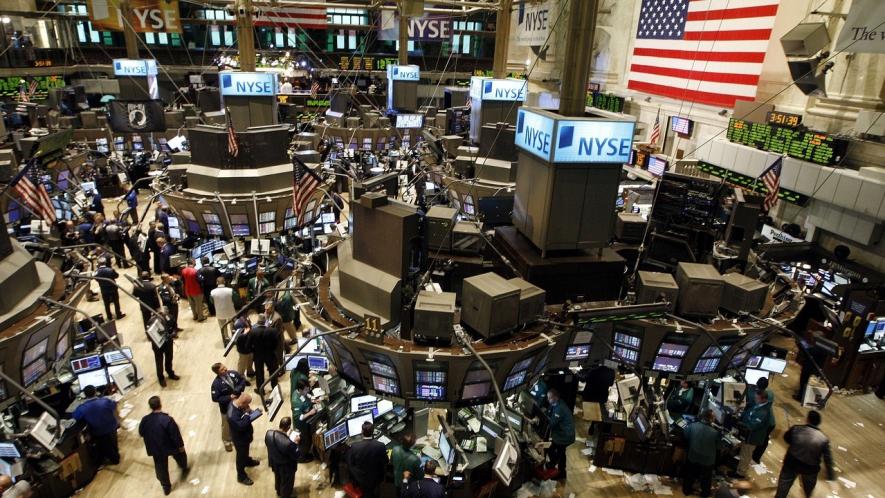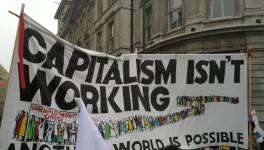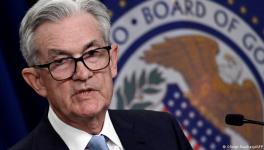Stock Markets on a Wild Ride

Global stock markets have been on a wild ride for the past few days. The Dow Jones Industrial Average, which tracks 30 major companies in the US, crashed by 666 points on Friday, 2 February. On Monday, it crashed further by 1175 points (4.6 per cent), which was its biggest one-day point drop in history.
Stock markets across the world tumbled as if on cue. The Nikkei 225, the stock index for the Tokyo Stock Exchange, declined by 4.7 per cent on Tuesday, while Hong Kong’s Hang Seng Index tanked by 5.1 per cent in panic selling. South Korea’s KOSPI Composite Index also witnessed sharp declines of 1.54 per cent and 2.31 per cent on Tuesday and Wednesday. The German DAX and the FTSE in the UK also saw declines on Tuesday.
In India, the BSE Sensex fell by 561 points to close at 34,196 on Tuesday, while the NSE’s Nifty 50 fell by 168 points.
The US stock markets staged a recovery subsequently, with the Dow Jones Industrial Average rising by 567 points on Tuesday.
The trigger for the carnage on the stock markets reportedly was the release of the US job markets data on Friday. The report said that unemployment rate was unchanged at 4.1 per cent as of January 2018. Average hourly earnings have risen by 75 cents, or 2.9 per cent over the year – the fastest it has grown since June 2009.
This slight uptick in wages have supposedly spooked the financial markets, because they fear that the wage growth would lead to higher inflation. And finance capital is notoriously wary of inflation, because it erodes the real value of their assets.
But the interesting thing here is, even the reported increase in wages is not as substantial as it is made out to be.
A piece by Matthew C Klein in Financial Times points out that wage growth has actually slowed slightly since the second half of 2016, taking a six-month average. “The Employment Cost Index – a comprehensive measure including benefits and adjusted for compositional effects – also has shown no real change in the growth rate in the past few years.”
Whatever upward trend that is visible is being driven by wage gains for those in managerial positions, who account for only 18 per cent of the private sector workforce, Klein shows. The wage growth of the 82 per cent of the rest of the private sector employees has shown no accelerating trend in the past four years. Those in managerial positions in financial services, such as investment bankers and traders, have in particular seen their wages growing sharply in the past few months.
But even the small wage growth was sufficient to trigger a massive crash in the stock markets. That finance capital reacts in such a manner to even the slightest reported improvements in the living conditions of the workers says something about the very nature of capitalism – it has to maintain a large section of people unemployed and underpaid to maintain its stability.
Speculation runs amok
The collapse of some popular financial instruments which sought to enable investors to make money by placing bets on the volatility of the stock markets attracted particular attention in the financial press in the recent days.
These instruments, or securities, which can be bought and sold in financial markets, tracked the changes in Cboe Volatility Index (VIX), “the world’s most widely followed turbulence gauge”. VIX, calculated and published by the Chicago Boards Options Exchange (CBOE), is a measure of expected market volatility based on options on the S&P 500 stock index. It was launched in 1993.
The securities mentioned above are exchange-traded products (ETPs) – securities which track an index, commodity, bonds, or a basket of assets. In this case, they track volatility in the stock markets as measured by VIX. These ETPs were designed in such a manner that the investors gain when volatility is low, and lose when volatility is high.
One such ETP, the ‘VelocityShares Daily Inverse VIX Short-Term ETN’ (known by its trading symbol XIV), issued by Credit Suisse, had seen its value peak at $2.2 billion on 11 January. XIV lost 96 per cent of its value overnight, as its price collapsed from $99 to about $10 on Monday after the “bloodbath” in Wall Street which caused VIX to rise by 116 per cent.
Another ETP which belongs to the same class, the ‘Next Notes S&P500 VIX Short-Term Futures Inverse Daily Excess Return Index ETN’ issued by Nomura Holdings Inc., Japan’s biggest brokerage firm, was valued at 32 billion yen on Monday. The market crash that followed wiped out 96 per cent of its value – it was valued at 1.3 billion yen as of 3 pm in Tokyo on Wednesday, according to a Bloomberg report.
Both Credit Suisse and Nomura have announced that the ETPs would be closed, since they have clauses that say the instruments could be closed if there is an 80 per cent loss in a day.
Other volatility-related funds such as the ProShares Short VIX Short-Term Futures (SVXY) have also seen steep crashes. ProShares has said that it would continue to operate the fund “as usual” since performance was “consistent with its objectives”.
With the rapid growth of financial markets, firms have come up with complex financial instruments which offer investors the opportunity to bet on all sorts of things. This large-scale gambling that financial markets facilitates is an inherent part of their DNA.
Financial markets are dominated by activities of speculators, and the object of most “skilled investment” here is to “beat the gun”, to outwit the crowd, as John Maynard Keynes pointed out in his 1936 classic General Theory of Employment, Interest and Money:
“… professional investment may be likened to those newspaper competitions in which the competitors have to pick out the six prettiest faces from a hundred photographs, the prize being awarded to the competitor whose choice most nearly corresponds to the average preferences of the competitors as a whole; so that each competitor has to pick, not those faces which he himself finds prettiest, but those which he thinks likeliest to catch the fancy of the other competitors, all of whom are looking at the problem from the same point of view. It is not a case of choosing those which, to the best of one’s judgment, are really the prettiest, nor even those which average opinion genuinely thinks the prettiest. We have reached the third degree where we devote our intelligences to anticipating what average opinion expects the average opinion to be. And there are some, I believe, who practise the fourth, fifth and higher degrees.”
The business of outwitting the crowd today is carried out with generous help from computers which carry out trading in the financial markets on the basis of algorithms. When some new development causes expectations about the future to change, changes in position taking are automatically triggered. The result is herd behaviour – the computers initiate changes in trading at the same time, typically in a similar direction – causing price bubbles and crashes.
Keynes’s perceptive words from General Theory are worth recalling here:
“Speculators may do no harm as bubbles on a steady stream of enterprise. But the position is serious when enterprise becomes the bubble on a whirlpool of speculation. When the capital development of a country becomes a by-product of the activities of a casino, the job is likely to be ill-done.”
Get the latest reports & analysis with people's perspective on Protests, movements & deep analytical videos, discussions of the current affairs in your Telegram app. Subscribe to NewsClick's Telegram channel & get Real-Time updates on stories, as they get published on our website.
























